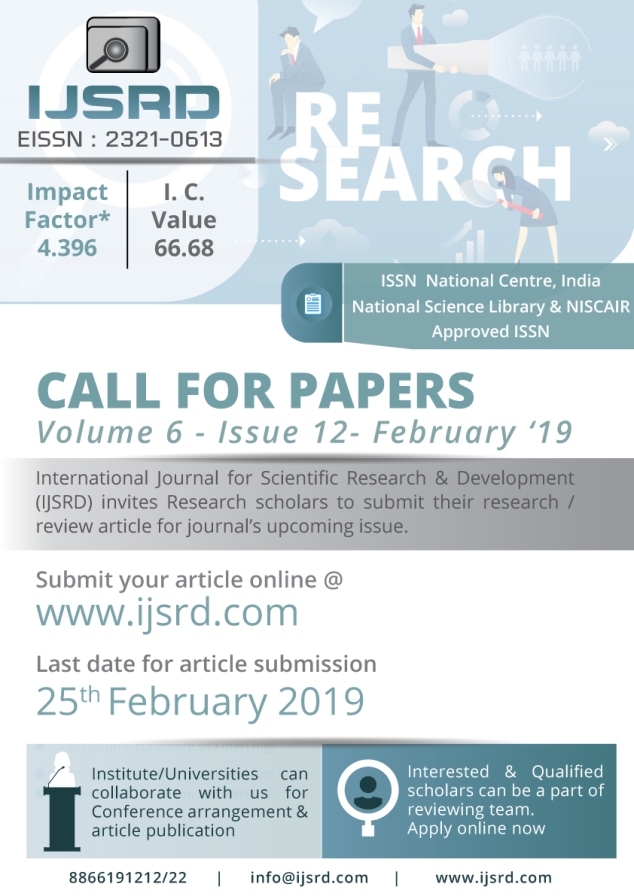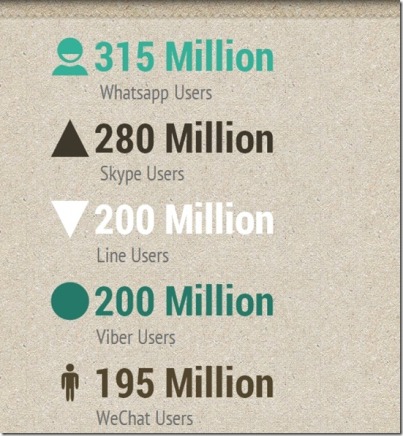research journal
IJSRD Journal | New IC Value: 66.68 (Year: 2016)
Greetings from Leading E-Journal: IJSRD (International Journal for Scientific Research & Development)
Consecutively Index Copernicus Indexed for 2 years – IC Value for 2016 : 66.68
Thanks to all Authors, Research Scholar and Students for your Support.
#IJSRD Cloud Computing : Achieve CPEL Criterion in Cloud with High Bandwidth and Cost Reduction
As we all know that cloud computing is one of the trending technology for data storage and sharing. Although its beneficial, it has to evolve more to be efficient in various models. One of the article submitted to IJSRD journal by Vishakha Om.Gupta and Prof. Yogesh Rai from Shree Institute of Science & Technology, RGPV University, Bhopal is focusing on Achieving CPEL Criterion in Cloud with High Bandwidth and Cost Reduction.
They briefly introduce their work as under…
Cloud computing implementation is fast and simple with benefits like, Cost reduction by gaining a worldclass IT infrastructure without the hardware, secure access to critical information 24/7 using only a Web browser, ability to stay mobile and many more. According to the survey 85 per cent of public sector organizations are using public cloud services, while on the other side data owner having concern about data confidentiality and query privacy due to the lost control of the infrastructure. To address these issues a criterion called CPEL is constructed; Data confidentiality, query privacy, efficient query processing, and low in-house processing cost. Satisfying these requirements will dramatically increase the complexity of constructing query services in the Cloud. Some related approaches have been developed to address some aspects of the problem. However, they do not satisfactorily address all of these aspects. We proposed the random space perturbation (RASP) approach with traffic redundancy elimination techniques, in which practical range query is constructed by using k-nearest neighbor (kNN) and range query algorithm, and to reduce redundancy in process predictive acknowledgement algorithm and redundancy aware routing algorithm is used by this way we can achieve CPEL criterion with high bandwidth of data processing with reduced cost.
#IJSRD More over this they have written in the article published at IJSRD that their proposed models would be working as under…
RASP is combination order preserving encryption, dimensionality expansion, random noise injection, and random project because of order preserving encryption confidentiality and indexing preserved by dimensionality expansion range query processing can be achieve , Random projection is mainly used to process the high dimensional data into low dimensional data representations which provides good scaling potential and performance , random noise injection used for adding noise which in result gives proper output .
In random space perturbation, the word perturbation is used to do collapsing this process will happen according to the key value that is given by the owner. In this module the data owner have to register as owner and have to give owner name and key value. And then the user have register and get the key value and data owner name from the owner to do access in the cloud. Here user can submit their query as range query or kNN query and get their answer. We analyze and show the result with encrypted and also in decrypted format of the data for the query construct by the user. kNN query cannot be directly impose on RASP perturbated data, so we have designed a kNN query processing algorithm based on range queries .We use square ranges, instead of spherical ranges, to find the approximate kNN results, so that the RASP range query service can be used.
As shown in below fig.1, working of RASP with kNN and Range query service, but here authorized user can upload, download, updates the similar data which increases data processing cost, to address this problem we are using predictive acknowledgement approach which is based on byte stream processing, Byte stream means it store the file as 1 byte that is 8 bit as a sequence of file, because of these increases the file download speed while transaction between the cloud and its end user’s. As shown in below fig. 2.
From their study shown in the article published at IJSRD, they concluded that “The key vantage of this scheme is the ability to get confidential and efficient query services with high bandwidth and reduced cost.”
To know more about such articles with innovative ideas please visit ijsrdscholarticles website.
To download more of such type of articles helping you in your research work please visit www.ijsrd.com
nearest neighbor (kNN) and range query algorithm, and to reduce redundancy in process predictive acknowledgement algorithm and redundancy aware routing algorithm is used by this way we can achieve CPEL criterion with high bandwidth of data processing with reduced cost
How Does Whatsapp Generate Revenue? #ijsrd
Whatsapp: The leading OTT messaging service. There is always a prominent question baffling every user’s mind – How is Whatsapp able to make money when its services are free of cost?
Whatsapp enables it’s user to send text messages, images, video and audio media to other whatsapp users. The said service is available on iOS, android, Symbian, blackberry OS and windows platforms.
On a different note, we know Facebook has recently bought Whatsapp. Do you want read about it? Read about it here! Just follow the link!
Okay, back to business now!
Whatsapp is earning its revenue through two different ways:
1) Subscription Fee: Whatsapp allows it’s user to enjoy Whatsapp services for free for first year. However, after that it charges $0.99 for continued service. But till date, I have not heard of a single person who has paid for this service. Interestingly, Whatsapp tend to extend the free service period every time a user reaches close to the expiry date.
So this method of revenue generation that seems like the only visible revenue generation scheme is actually not generating the revenue for Whatsapp.
2) According to my speculation, the revenue generation for Whatsapp is primarily through database management. All the conversations on Whatsapp are backed up on Whatsapp servers constantly. Our conversations reflect our interests, likes, dislikes and majorly depicts our preferences. This information is invaluable to big firms where relevant tailor made products can be offered after data sorting.
Let’s take a deeper look into this!
Whatsapp users have been ever increasing since launch currently numbering out users on any other competitor.
Given such high number of users, the number of messages exchanged per day is also incredibly high in case of Whatsapp- peaking as high as 11 billion. With such extensive information available on Whatsapp backups, the big companies are willing to pay handsome amounts for information extraction.
This data management scheme is merely a speculation. As evident, Whatsapp is not involved in ad marketing. Any Whatsapp user can vouch for the fact that Whatsapp does not support advertisements. Whatsapp’s CEO Jan Koum clearly states that Whatsapp is meant for instant messaging and forcing advertisements would disrupt the sole meaning of Whatsapp and instant messaging. There is no way to justify the data management ideology, but then there is no other justified revenue model as well in the store.
Reference : http://www.edupristine.com/blog/cfa-alternative-investment-whatsapp-revenue-model-speculated/







